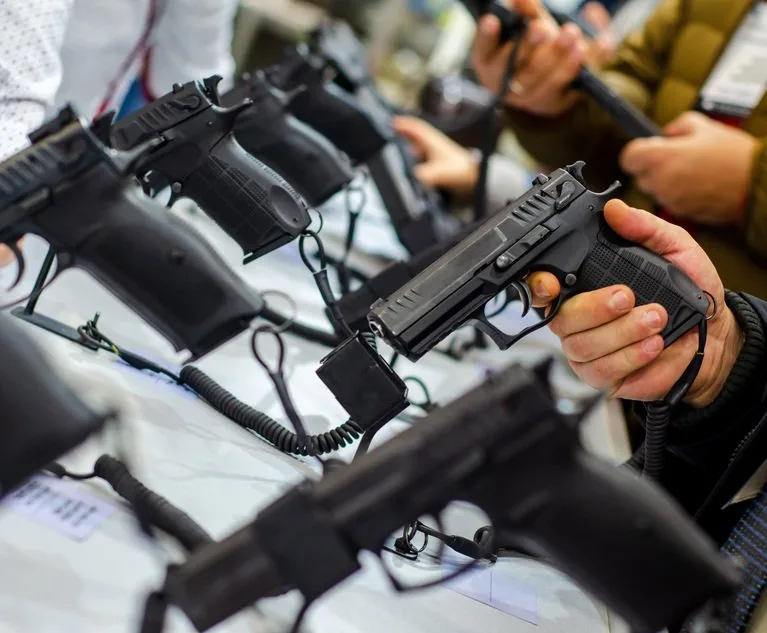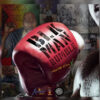
Under the leadership of recently elevated Chief Judge Rowan Wilson and with the addition of Judge Caitlin Halligan, the New York Court of Appeals is ushering in a new era. Prior to last August’s abrupt resignation of then-Chief Judge Janet DiFiore, the seven-member court was controlled by four relatively conservative judges who routinely voted as a block, rarely siding in favor of civil rights or against law enforcement. With Judge DiFiore’s departure and Judge Halligan’s arrival, the Court of Appeals is now much more balanced, opening the door to a more progressive approach to civil rights and civil liberties.
The new court immediately faces a controversy that may serve as an important signal of its approach to the criminal-justice system, constitutional claims and race. On Sept. 13 the court will hear argument in six cases arising from last year’s U.S. States Supreme Court ruling invalidating New York’s gun-licensing scheme and confronting that case’s ramifications for those convicted in New York of unlicensed possession of firearms, most of whom are Black or Latino. How the Court of Appeals approaches these cases will be a telling indicator of what lies ahead.
An NBA Phenom’s Downfall
In June 2022 the Supreme Court dramatically expanded the scope of the Second Amendment’s right to possess guns, holding in New York State Rifle & Pistol Association v. Bruen, 142 S.Ct. 2111 (2022), that the amendment’s guarantees extend beyond possession of firearms in the home to possession in public. Having taken that seismic step, the court then held that New York’s scheme for licensing the public carry of firearms was subject to close constitutional scrutiny and further held that that scheme was invalid in light of its requirement that “proper cause” be shown for a person to obtain a license to possess a firearm in public.
The six cases now before the Court of Appeals involve defendants convicted of unlawful possession of firearms in public before Bruen was decided on June 23, 2022, and whose cases were on appeal at that time. The defendants argue their convictions cannot be sustained in light of the Supreme Court’s ruling that the Second Amendment encompasses a right to carry a firearm in public.
A representative case is People v. Telfair, which also presents a dramatic personal story. The defendant there is Sebastian Telfair, a Black man who as a teenager jumped from a Brooklyn high school to the NBA in 2004 as a nationally recognized basketball talent. He never lived up to the hype, bouncing around the NBA for 10 years. But things turned darker for him in the early morning hours of June 11, 2017, back on a Brooklyn street in circumstances that raise myriad issues in light of the documented role of race in police stops and the decriminalization of marijuana. As described by the Second Department:
Law enforcement officials assigned to the Anticrime Unit of the 77th Precinct were on routine patrol in an unmarked vehicle in the area of Atlantic Avenue and Classon Avenue in Brooklyn, when they observed a blue Ford F–150 truck, which had been parked on a concrete median across from the Milk River nightclub, make a U-turn without having its headlights on. The truck was occupied by two individuals, and driven by defendant Sebastian Telfair. The defendant proceeded to drive the vehicle without headlights into a gas station, and the officers pulled the vehicle over in the gas station. As the officers approached the vehicle, they smelled marijuana coming from the truck and observed a lit marijuana cigarette in the center console. The marijuana cigarette was seized by the officers, and the defendant and his friend were arrested. The officers transported the two men and the truck to the 77th Precinct. While at the precinct, the officers conducted a license check of the defendant and a vehicle registration search, and determined that the defendant’s license was suspended, and that he was the registered owner of the truck. After an inventory search, the police recovered numerous items, including luggage, clothing, sneakers, jewelry, various bags, two small bags of marijuana and cash. The officers also found a loaded 45–caliber gun in the center console of the truck, and three additional handguns and ammunition in the flatbed area.
In August 2019 Telfair was convicted of criminal possession of a weapon. At trial he did not raise a Second Amendment defense, nor did his appeal to the Second Department, which in October 2021 rejected all the arguments he did make. (Ironically, the panel included Presiding Justice Hector LaSalle, whose failed nomination to replace Janet DiFiore as chief judge paved the way for Judge Wilson’s appointment.) In December 2021, a dissenting member of the panel granted Telfair’s motion for leave to appeal to the Court of Appeals on the key issue Telfair’s counsel had pressed. Six months later, with Telfair’s case on the Court of Appeals’ docket, the Supreme Court decided Bruen.
People v. Telfair and the other five cases scheduled for argument next month raise a welter of issues, but two are central. The threshold question is whether the defendants can even invoke Bruen and claim the conduct they were convicted of was constitutionally protected when they did not assert a Second Amendment defense at trial or in their Appellate Division appeals and when they had never applied for a gun permit. Intertwined with this issue is the pivotal one of the scope of Bruen, with the defendants contending it nullified the New York licensing scheme entirely and recognized a broad constitutional right to carry firearms in public.
The New York Attorney General’s office has intervened in the cases and has taken an aggressive position on both issues, as exemplified by the brief it filed in Telfair’s case. On the defendants’ ability to assert a Second Amendment defense, the state argues that long-established preservation rules apply: “[Telfair’s] claim that New York’s gun laws violate the Second (and Fourteenth) Amendment right of an individual to keep and bear arms … were never presented to the trial court.” The state also contends that Telfair’s argument that it would have been “futile” to raise a Second Amendment defense is unavailing, both because no futility exception exists in preservation law and because lower federal courts around the country were recognizing expanded Second Amendment rights even before Bruen such that it would not have been futile to raise a Second Amendment defense. Finally, the state argues Telfair cannot seek to invoke Bruen’s invalidation of New York’s licensing scheme because he never applied for a permit and thus cannot claim “standing” arising from the unconstitutional scheme.
Beyond the threshold issue of being able to invoke Bruen, the state argues Bruen offers Telfair no help. In its view, the Supreme Court’s decision did nothing other than invalidate one specific element of New York’s licensing scheme and otherwise left undisturbed state authority to regulate and criminalize firearms possession:
Although Bruen invalidated New York’s “proper cause” requirement, the decision did not, in any way, cast doubt on the power of the states to impose licensing requirements or to criminalize the unlicensed possession of firearms. Indeed, the court noted “the right to keep and bear arms in public has traditionally been subject to well-defined restrictions governing the intent for which one could carry arms, the manner of carry, or the exceptional circumstances under which one could not carry arms.” Further, the court approved of licensing requirements—like the requirements that an applicant undergo a background check and pass a firearms safety course—that are designed to ensure that “those bearing arms in the jurisdiction are, in fact, “law-abiding, responsible citizens.”
Whether Telfair and the other defendants can raise Second Amendment defenses for the first time in the Court of Appeals presents a slew of complicated doctrinal issues, but their resolution may lie in how the court interprets Bruen. Were Bruen viewed broadly as establishing an absolute Second Amendment right to possess in public a loaded firearm free from state licensing, Telfair would stand convicted of having engaged in constitutionally protected activity, and the Court of Appeals could not leave that undisturbed, notwithstanding preservation obstacles. Conversely, were Bruen viewed narrowly as invalidating only the “proper cause” requirement, Telfair’s unlicensed possession of the gun might be protected only if he plainly would have been denied a license solely for that reason.
A fair reading of Bruen lies somewhere between these two poles, closer to the one advocated by the state. The path here for the Court of Appeals may be to assess the scope of Bruen, then return the cases to the trial courts to determine whether the defendants’ conduct fell within that scope or not. For defendants plainly engaged in protected conduct and who otherwise would have been able to secure a license, their convictions could be vacated. Conversely, for defendants whose conduct fell outside of the scope of Bruen—for instance, a person possessing large numbers of weapons they intended to sell—their convictions would remain valid.
Not addressed in these considerations is the role of race lurking behind this controversy. As the public-defense community has rightly noted, enforcement of New York’s gun-licensing scheme falls heavily on Black and Brown people, many of whom have legitimate concerns about personal safety but have been unable to obtain licenses because of the state’s licensing scheme. According to an amicus brief filed by public defenders in Bruen, Black people accounted for 78% of New York’s felony gun-possession cases, and 96% of those arrested by the NYPD for the specific charge of which Telfair was convicted were Black or Latino. That the white NRA-connected New Yorkers behind the Bruen challenge now can claim a constitutional right to carry guns in public for claimed self-defense must weigh into the Court of Appeals’ consideration of the claims of Black and Brown New Yorkers who have compelling self-defense concerns.
Looking Forward
The gun cases confronting the new Court of Appeals present extremely difficult issues. On the one hand, compelling concerns about public safety should drive the court to take a very narrow view of Bruen and its consequences for a constitutional right to carry guns in public. On the other hand, the court is deciding the fate of defendants facing lengthy prison sentences for engaging in activity that may now be constitutionally protected, with the state arguing the defendants do not even get to raise the recent sea change in Second Amendment law. On top of all this, the court must keep in mind the large number of people incarcerated right now for gun-possession convictions for which all appeals have been exhausted but who now may seek to vacate their convictions.
As so often is true, these cases do not expressly present race claims, but race is woven into the controversy. It will bear close watching to see if members of the court discuss the racial dimensions of the dispute before them, as that may be a harbinger of the court’s willingness to revisit precedent bearing on race and the criminal-justice system. For instance, the court soon will decide a case that was argued last November and then scheduled for re-argument, presumably because the six sitting judges—the DiFiore vacancy had not been filled—deadlocked. That case, People v. Rodriguez, involves a police stop in Queens of a brown-skinned man riding a bicycle and resulted in the discovery of a gun; it presents the court with the opportunity to start reconsidering New York law governing police stops in a context in which research shows race to be a significant factor affecting which cyclists gets stopped.
Christopher Dunn is the legal director of the New York Civil Liberties Union. He can be reached at [email protected].


